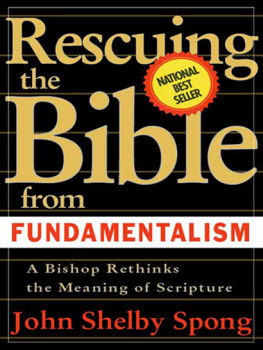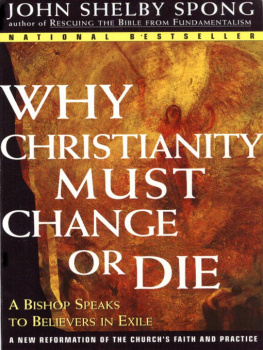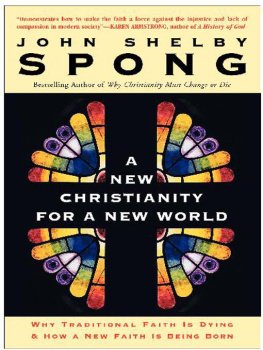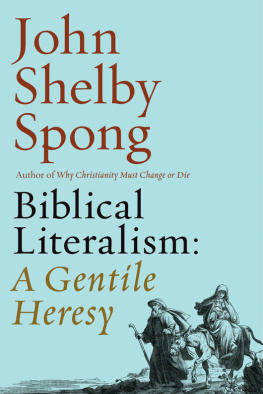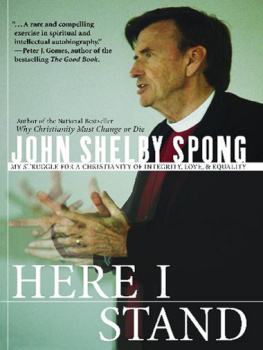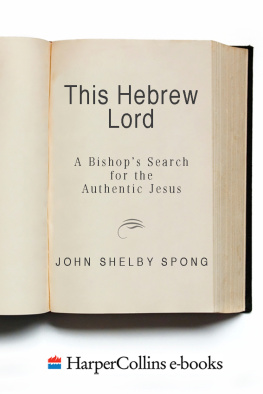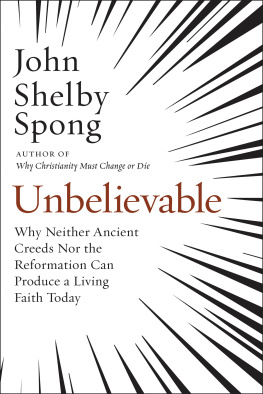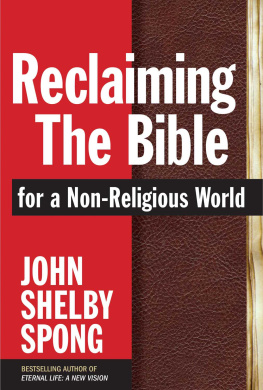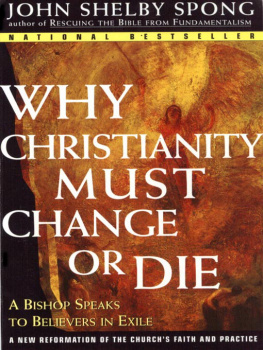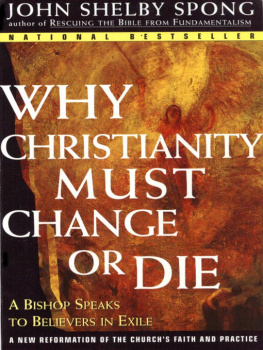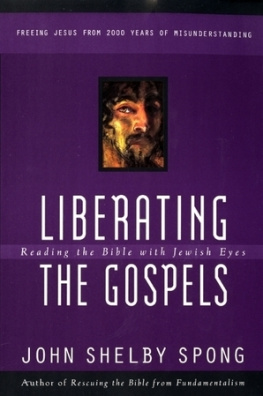Spong - Rescuing the bible from fundamentalism: a bishop rethinks this meaning of script
Here you can read online Spong - Rescuing the bible from fundamentalism: a bishop rethinks this meaning of script full text of the book (entire story) in english for free. Download pdf and epub, get meaning, cover and reviews about this ebook. year: 2014, publisher: HarperCollins e-Books, genre: Religion. Description of the work, (preface) as well as reviews are available. Best literature library LitArk.com created for fans of good reading and offers a wide selection of genres:
Romance novel
Science fiction
Adventure
Detective
Science
History
Home and family
Prose
Art
Politics
Computer
Non-fiction
Religion
Business
Children
Humor
Choose a favorite category and find really read worthwhile books. Enjoy immersion in the world of imagination, feel the emotions of the characters or learn something new for yourself, make an fascinating discovery.
- Book:Rescuing the bible from fundamentalism: a bishop rethinks this meaning of script
- Author:
- Publisher:HarperCollins e-Books
- Genre:
- Year:2014
- Rating:5 / 5
- Favourites:Add to favourites
- Your mark:
- 100
- 1
- 2
- 3
- 4
- 5
Rescuing the bible from fundamentalism: a bishop rethinks this meaning of script: summary, description and annotation
We offer to read an annotation, description, summary or preface (depends on what the author of the book "Rescuing the bible from fundamentalism: a bishop rethinks this meaning of script" wrote himself). If you haven't found the necessary information about the book — write in the comments, we will try to find it.
Rescuing the bible from fundamentalism: a bishop rethinks this meaning of script — read online for free the complete book (whole text) full work
Below is the text of the book, divided by pages. System saving the place of the last page read, allows you to conveniently read the book "Rescuing the bible from fundamentalism: a bishop rethinks this meaning of script" online for free, without having to search again every time where you left off. Put a bookmark, and you can go to the page where you finished reading at any time.
Font size:
Interval:
Bookmark:
RESCUING THE
BIBLE
FROM
FUNDAMENTALISM
A Bishop Rethinks the Meaning of Scripture
John Shelby Spong

TO
CHRISTINE MARY SPONG
my wife
In January of 1989 I appeared on ABC's Good Morning America show to be interviewed by host Charles Gibson. I had made a public speech earlier that month in which I had raised questions about how we Christians could continue to call the Bible the Word of God when many of its passages reflected facts that twentieth-century Christians simply do not acknowledge as true and attitudes that twentieth-century Christians do not share.
In ABC's desire to present a counter point of view, Jerry Falwell, a well-known television evangelist, was also invited to participate in this discussion. The interview was set for the normal segment of five and a half minutes. However, when the discussion was interrupted for a commercial, Charles Gibson immediately canceled his next scheduled guest and ordered the dialogue to go on for an additional segment of five and a half minutes. An eleven-minute segment on one of these national morning television talk shows is very rare indeed. We clearly had touched a vital nerve in the religious soul of this nation and were debating a question that interested many.
Following this interview I wrote Jerry Falwell with the idea that he join me in a series of national debates on the Bible. I suggested to him that a debate between the two of us on the Bible had the potential to excite this nation and to turn our people anew toward serious reading of Holy Scripture. Jerry Falwell was not impressed by this proposal and responded, not personally but through the media, that he did not want to lift me out of my anonymity. I was not surprised, for Jerry is not well equipped for such a debate.
A lesser-known evangelist, John Ankerberg, did, however, accept the challenge, and we had three hours of debate that played across the nation on cable television in six thirty-minute segments in the fall of 1989. The response to these public media opportunities convinced both me and my publisher that a book on these issues would meet a very present need in the religious life of this nation and perhaps in the Western Christian world.
There are many well written and even brilliant works of biblical scholarship available to the clergy, the scholars, and the academicians. There are many tracts, pamphlets, and books from the pens of fundamentalist Christians designed to defend biblical inerrancy and to shore up sagging weaknesses in the defensive armor of the literalists. There are, however, few volumes that take seriously the current levels of biblical scholarship and make that scholarship available in an understandable form to the average lay person who sits in the pews of our churches or to that person who wants to be a Christian but who does not find in his or her church a sufficient reason to invest life in that institution.
Most Christians who are generally unaware of this scholarship seem to believe that they must either be biblical literalists or admit that the Bible contains nothing of value for them. I am convinced that there is another alternative, that intelligence does not have to be a casualty of church life, that God can be worshiped with our minds, and even that biblical ignorance is unworthy of a disciple of Jesus Christ. It is my desire to make that alternative universally available. I want to place the biblical and theological debates that are commonplace among scholars at the disposal of the typical churchgoer.
So it was that the idea of this book was born under the encouragement of both my editor, Jan Johnson, and my publisher, Clayton Carlson at HarperSanFrancisco. For the next two years, my study life was reorganized around this task. The result has been not only the completion of this volume but an ever-deepening renewal of my love for Holy Scripture and my search for that elusive truth of God that lies beneath the literal words of that sacred text. In many ways I have Jerry Falwell to thank for these gifts to me.
I also wish to thank Charles Gibson and the staff of ABC's Good Morning America for sensing a story in this discussion and for risking a religious controversy in order to bring that story to their audience.
As this book developed, I tested its material in various places around the country. St. Barnabas' Episcopal Church on Bainbridge Island in the state of Washington invited me to be their scholar in residence in the summer of 1989. For a period of time, I sat on a deck above the magnificent Puget Sound with books scattered about me, writing great chunks of this manuscript. In exchange for their hospitality, I also lectured on this material to the members of this congregation and any of the Bainbridge Island public who cared to attend. There was tremendous interest. More than one hundred people attended these lectures on weeknights in July! The response of the people of Bainbridge Island convinced me anew that such a book was not only desired but badly needed.
My special thanks go to the Episcopal bishops of that part of the State of Washington, Robert Cochrane and Vincent Warner, for their welcome of me as a teacher into their diocese. I also thank the past and present rectors of that church, the Reverend David L. Heaney and the Reverend Joseph J. Tiernan, for inviting me to that exquisitely beautiful spot on not one but two occasions, and the adult education committee, headed by Linda Fullerton, Christine Shrader, and Barry Mills, who designed the scholar-in-residence program.
I also tested this material in a Lenten series of addresses at my former parish, St. Paul's Church in Richmond, Virginia, at the invitation of the Reverend Canon Robert Heatherington, rector, and the Right Reverend Peter Lee, bishop of Virginia.
I worked further on this manuscript and preached and lectured out of its content at The Church at Point O'Woods, New York. This quiet summer community, where I have been the guest pastor for over ten years, has been an oasis of tranquillity for me in my swirling and controversial life as a bishop. For that gift of peace I am most grateful.
To the clergy and people of the Episcopal Church in the Diocese of Newark, I express both my thanks and my gratitude for the opportunity they have given me to serve them as their bishop. This community of faith has inspired me almost daily to pursue my calling as a bishop who dares to take seriously the scholarly teaching function of the episcopacy. I do not know any Christians anywhere who live out so consistently their baptismal vows to seek Christ in all people and to respect the dignity of every human being. I salute them as my partners in the journey of faith, which I believe to be nothing less than a journey into the reality of God. I especially want to acknowledge the Reverend John Branson and the Reverend Elizabeth Wigg-Maxwell of St. Paul's Church in Chatham, New Jersey, and the Reverend Richard Shimpfky and the Reverend Bonnie Perry of Christ Church in Ridgewood, New Jersey, who hosted lectures that I gave as part of the New Dimensions lecture series, which made public the content of this book for the first time in our diocese.
I also acknowledge my debt to my close friend and mentor the Right Reverend John Elbridge Hines, the former presiding bishop of the Episcopal Church, who has been my father in God for more than twenty-five years, and whose wise counsel I have received in weekly telephone calls and semiannual visits since I was elected bishop.
Over the last three years, as a gift to me from the Diocese of Newark, I have been privileged to enjoy a sabbatical study month each February. I have spent that month first at Union Theological Seminary in New York, then at Yale Divinity School in New Haven, and finally at Harvard Divinity School in Cambridge. My thanks go to the deans at each of these institutions, to the faculties, to the librarians, and to the students, all of whom enriched my life and opened my mind during these refreshing study times.
Font size:
Interval:
Bookmark:
Similar books «Rescuing the bible from fundamentalism: a bishop rethinks this meaning of script»
Look at similar books to Rescuing the bible from fundamentalism: a bishop rethinks this meaning of script. We have selected literature similar in name and meaning in the hope of providing readers with more options to find new, interesting, not yet read works.
Discussion, reviews of the book Rescuing the bible from fundamentalism: a bishop rethinks this meaning of script and just readers' own opinions. Leave your comments, write what you think about the work, its meaning or the main characters. Specify what exactly you liked and what you didn't like, and why you think so.

